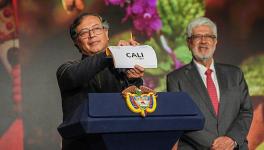US is a World Outlier on Abortion Restrictions

Representational image. | Image Courtesy: Flickr
We know the United States is an outlier in abortion restrictions, but it is still startling to realise just how much.
In the last two decades, 50 countries around the world have liberalised abortion laws. Some reform is still restrictive, enabling abortion when there is a threat to the pregnant person’s life or when pregnancy results from rape. But while these changes have resulted in overturning total bans on abortion, the United States is going in the opposite direction.
The US Supreme Court on June 24 overturned the nearly half-century-old Roe v. Wade case that guaranteed the constitutional right to an abortion. The court enabled the ability of 50 individual U.S. states to ban abortion. Twenty-six states are either certain or considered likely to enact the ban.
Nowhere is the American outlier status more visible than among industrialised nations. In the 27 European Union members, abortion is completely legal in almost every country. One notable exception is Poland, which has a near-total ban.
Canadian Prime Minister Justin Trudeau, French President Emmanuel Macron, and British Prime Minister Boris Johnson “all condemned the Supreme Court’s overruling of… [Roe v. Wade], while New Zealand’s prime minister, Jacinda Ardern, said the decision was ‘incredibly upsetting,’” the Guardian reported.
At the United Nations…
On June 24, Michelle Bachelet, the UN High Commissioner for Human Rights, said, “The U.S. Supreme Court ruling on Dobbs v. Jackson Women’s Health Organization delivered today represents a major setback after five decades of protection for sexual and reproductive health and rights in the U.S. through Roe v. Wade.” She added, “It is a huge blow to women’s human rights and gender equality.”
Bachelet also warned that “This decision strips such autonomy from millions of women in the U.S., in particular those with low incomes and those belonging to racial and ethnic minorities, to the detriment of their fundamental rights.”
That same day, Stéphane Dujarric, the spokesperson for UN Secretary-General António Guterres, said, “Sexual and reproductive health and rights are the foundation of a life of choice, empowerment and equality for the world’s women and girls,” adding, “Restricting access to abortion does not prevent people from seeking abortion; it only makes it more deadly.”
Still, the 193 UN member countries are not unanimous on abortion, despite Bachelet’s audacious statement. According to the UN’s most recently gathered report on world population policies (as interpreted in Wikipedia’s article on abortion law), as of 2017, “abortion is allowed in 98 percent of countries in order to save a woman’s life. Other commonly accepted reasons are preserving physical (72 percent) or mental health (69 percent), in cases of rape or incest (61 percent), and in cases of fetal impairment (61 percent). Performing an abortion because of economic or social reasons is accepted in 37 percent of countries. Performing abortion only on the basis of a woman’s request is allowed in 34 percent of countries, including in Canada, most European countries and China.”
Watch the Gag Rule, the Helms Amendment
The “global gag rule prevents foreign nongovernmental organizations [that seek funding from the US] from using their own, non-US funds to provide abortion services, information… or advocacy,” as the Guttmacher Institute, a research group into reproductive health care, explains.
The global gag rule policy was first created at the women’s conference in Mexico City in 1984 and has since been the ball in political ping-pong in the U.S., having “been put in place by Republican presidents and rescinded by Democratic ones.” “President Joe Biden has rescinded the global gag rule” that his predecessor Donald Trump had imposed; but “that is only a short-term solution,” says the Guttmacher Institute.
Any future US Congress or president can reimpose the gag rule with a stroke of the pen. Still in existence is the Helms Amendment to the Foreign Assistance Act, which has prohibited the US federal government from providing support for abortion services around the world, even in countries where abortion is legal. For example, this inhibits the US Agency for International Development from aiding family planning services.
The answer is new legislation, such as the Global Health, Empowerment and Rights Act, that would end U.S. interference in what organisations do with their own money. It is still on the table in the House and the Senate.
As Human Rights Watch states: “Access to safe and legal abortion is a matter of human rights, and its availability is the best way to protect autonomy and reduce maternal mortality and morbidity.”
Evelyn Leopold is a writing fellow and correspondent for Globetrotter. She is an independent journalist based at the United Nations and the winner of a UN Correspondents Association gold medal for her reporting. She served at Reuters as a manager, editor and correspondent in New York, Washington, London, Berlin and Nairobi. She is a member of the Council on Foreign Relations and head of the Dag Hammarskjöld Fund for Journalists.
Get the latest reports & analysis with people's perspective on Protests, movements & deep analytical videos, discussions of the current affairs in your Telegram app. Subscribe to NewsClick's Telegram channel & get Real-Time updates on stories, as they get published on our website.
























